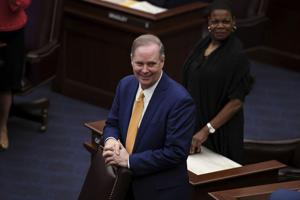Florida lawmakers await updated revenue forecasts before wading deep into budget

(The Center Square) – With four weeks left in the 60-day legislative session, it is time to get into the nitty-gritty of Florida’s near-$100 billion spending plan that goes into effect July 1.
The Florida House will review its proposed $97.1 billion FY22 budget, outlined in the 82-page APC 21-01, and the Senate will also discuss its tentative $95 billion proposal in its 423-page budget, SPB 2500, in floor sessions this week.
But all eyes will be on Thursday’s Revenue Estimating Conference (REC) when state economists are expected to further upwardly revise a two-year projected pandemic-induced income shortfall of $5.4 billion that was scaled back in December to $3.3 billion.
The revenue update and different approaches in allocating federal money make both preliminary plans, always tentative at this stage of the session, even more uncertain than usual.
The House plan allocates $10.2 billion in assistance from the $1.9 trillion American Rescue Plan adopted last month by Congress, while the Senate plan does not allocate any of the non-recurring federal money while slashing $2.5 billion in spending.
Senate President Wilton Simpson, R-Trilby, and Senate Appropriations Chair Kelli Stargel, R-Lakeland, say they will keep the federal money separate from the budget process – for now – to ensure it is well spent, perhaps allocating it in a special session as Gov. Ron DeSantis has suggested.
In addition, both proposed FY22 plans – as well as Gov. Ron DeSantis’ $96.6 billion spending request, now $100.9 billion with $4.3 billion in federal American Rescue Plan monies added – were based on revenue estimates that have proven to be far below actual collections.
State economists wrote in the August General Revenue Fund Financial Outlook Statement adopted by the Revenue Estimating Conference (REC) that Florida’s general revenues will fall $5.4 billion shy over the next two years.
The REC forecast a $3.4-billion shortfall this fiscal year and a $2-billion decline in revenue for FY 22 that it projected March 2019.
REC revenue forecasts are the foundation of data that lawmakers use to craft the state’s budget.
On Dec. 21, the REC updated its forecast, adding nearly $1.5 billion in FY 21 and $623 million in FY22 revenues, leaving about a $3.3 billion shortfall over the next two years.
Last week, the Legislature’s Office of Economic & Demographic Research reported February general-revenue collections came in $298.5 million above forecasts, indicating that when the REC convenes on Thursday, it is likely to deliver good news to state budget writers.
Among controversial components of the tentative spending plans is Simpson’s push to address the Florida Retirement System (FRS), which he calls “the single largest threat to Florida’s balance sheet,” in the Senate budget with a proposed bill requiring government employees to enroll in a 401(k)-type plan rather than into the FRS).
Senate Bill 84, filed by Sen. Ray Rodrigues, R-Estero, would require new public employees hired after July 1, 2022, to enroll in the investment plan and not the FRS.
The FRS is the nation’s fourth-largest public pension plan. It serves about 5.1 million Floridians, including 4.425 million retirees, who work or retired from the state, 177 cities, 151 hospitals, 74 school districts and dozens of special districts.
SB 84 would affect more than 430,000 retirees and retirement plans for at least 645,000 public service workers, opponents argue in what could be one of the signal fights of the legislative session.
At the start of the session in March, Simpson said in 2012, FRS’s unfunded liability was $21.6 billion. He said it’s now $36 billion.
Disclaimer: This content is distributed by The Center Square

